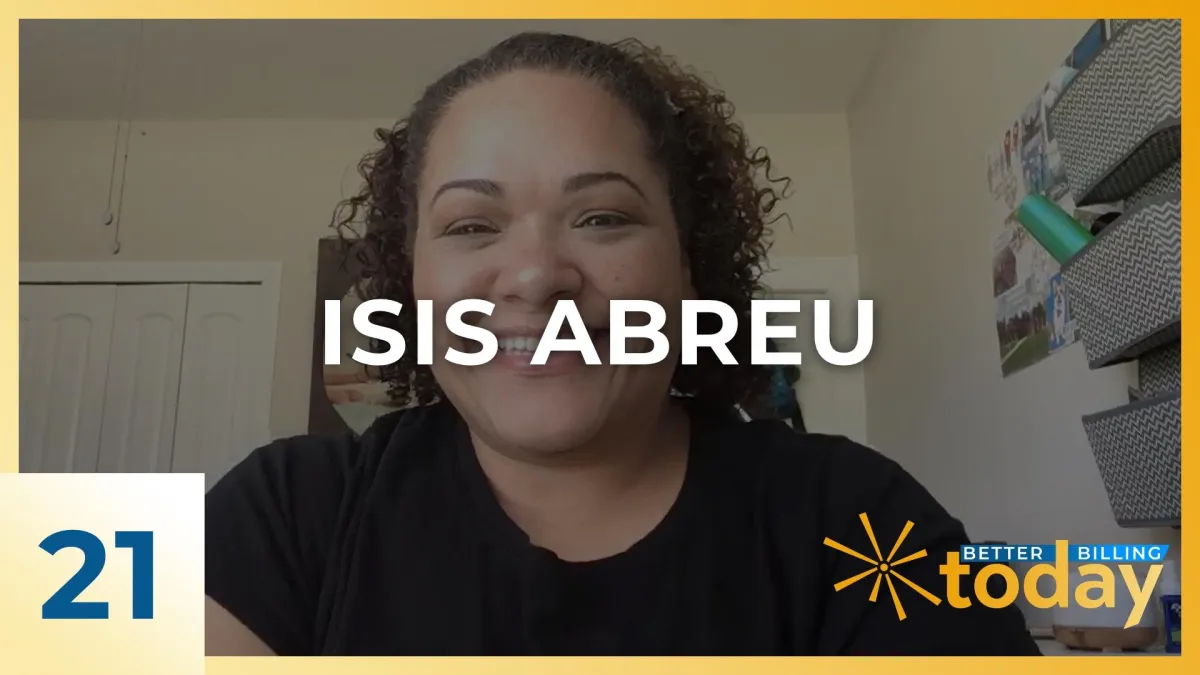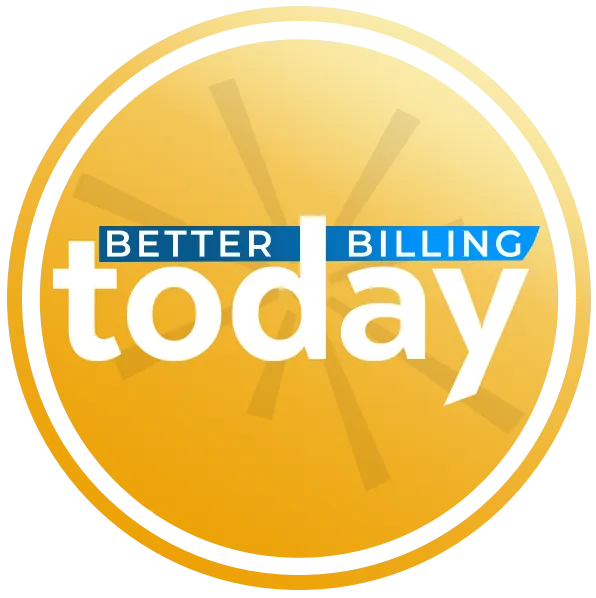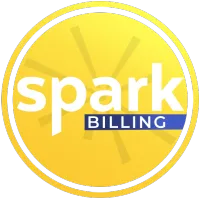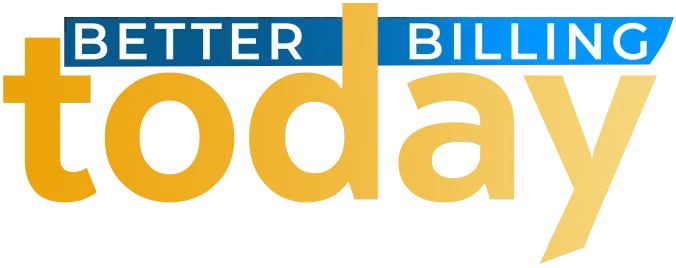Latest Episodes

BBT Ep. 21: Isis Abreu
In this episode we're talking with medical billing & coding specialist Isis Abreu.
Listen on Spotify: https://podcasters.spotify.com/pod/show/better-billing-today/episodes/Ep--21-Isis-Abreu-e2b8kr7
Watch on YouTube: https://bit.ly/3FG8J4G
Transcript:
Welcome to this episode of the Better Billing Today podcast. My name is Adam Welchel. I'm the owner of Spark Billing Services, helping small practices, clinics, doctors, and their staff improve the patient financial experience, streamline your operations, improve your workflows, and improve your cash flow.
On this episode, I'm interviewing a professional medical billing specialist. Her name is Isis Abreu and she has 17 years doing medical billing and coding for ambulance services, DME, pharmacy, chiropractor, and more on this episode. We dive into the considerations around choosing a specialty for your medical billing career.
So if you're listening to this podcast and you're a medical billing professional yourself, and you're thinking about making a transition or learning a new industry, Isis has some advice for you on how she navigated different disciplines that she was able to work in. Isis also takes us through a scenario where she helped a business go from paper based server side billing software to cloud based and completely digital and what that did for the company and the transformation that it brought to the owners and the patients that they were able to help.
So let's dive into that interview with Isis Abreu and see what she has to say from the perspective of a medical billing specialist!
Isis, you've been in the medical billing coding space for a while. Can you give me a Just a background of what you've been doing and what your skills are and what you specialize in?
I've been doing medical billing for 17 years now. I started with working at practices and doing the coding and the billing for them. Then I moved on from working gastro, internal medicine gynecology, then I did chiropractic as well. Then I moved into DME; so I did DME for a while. Then I went to ambulance billing, which is a whole different can of worms.
I did that for about five years and Then after that now I'm back doing DME.
Wow. Okay, so Quite the resume and lots of experience in coding and medical billing which one just personally what do you prefer? Would you rather do the coding or would you rather do the billing?
I'd rather do a billing because you get to yell at people; you get to argue with insurance!
Man, music to my ears! We have had some fun times with insurance companies especially after COVID seeing that the new people coming into medical insurance claim handling are not nearly as educated as they used to be. And we find ourselves educating the insurance agents or the claims manager that, "hey, you need to look at this part of the claim here. You need to look there. The codes are here. Do you know what you're looking at?" And they're like, no, I didn't know that was there. So I need you to approve this and push it through.
Yeah, exactly. A lot of these insurances, they just have a script that they go over and anything beyond that script, it just dumbfounds them!
And you gotta be like, I need to speak to a supervisor. I need to escalate this. I need to speak to my provider rep because you're processing our claims incorrectly; that kind of thing. And a lot of new people don't know that.
Yeah, it's unnecessary denials just based on lack of education, lack of understanding, lack of experience, and one of the things that, we've been able to help our providers with is, maybe there's plenty of claims that you can do inside your office, but when you need a subject matter expert to step in and just help you push that claim through. It makes all the difference.
One of the things we've seen work is when there's this hybrid connection between an internal biller and an outside expert that may work for some of these practices that are not necessarily large enough to need somebody full time. You've always worked in the office or have you ever worked remotely?
I have worked in the office when I did the ambulance billing, that's when COVID started. So that's when I've done remote and then now I'm doing the DME remote.
How have you in, in 17 years of billing and coding, what are some of the biggest changes when, was there a significant change in the way you worked when you were working in the office versus working remotely?
When I started working in the office, we did everything paper. Nothing was electronic; everything was paper. We had piles and piles of papers and HIGFAs and everything and envelopes. And we had cases of mail that went out every single day versus now everything's electronic. You just click a button, push it up to the clearinghouse sends it out, so that's a big, huge change. And then the volume of work that you're able to do electronically compared to doing everything manually writing or, setting up the printing in and everything else and stuffing envelopes for like days on end versus now you could like the amount of claims that could go out is ridiculous compared to the couple that you could do daily manually.
Yeah. When you've seen, have you seen personally practices change from paper to cloud based or even just software based? What's been your experience helping those practices make those transitions?
For the ambulance, when I worked for them, everything was paper and I was just dumbfounded. It's like, why is nothing going electronic? So I'm like telling the owner you need to get us a clearing house and you need to do this and you need to do this and you need to do this. And I wind up being, turning into a supervisor later on, but cause we brought the company from a million dollar company to a 10 million company cause just, we were able to process so much stuff so much faster and also set everything up where we're getting all these payments electronically as well, where the payments are not lost in the mail. They're not in limbo.
We're getting all these payments coming in a large quantity, but converting everything from paper to. Electronic is a process for the company because everything needs to get scanned. Everything needs to get uploaded into a cloud. So it doesn't get lost. It doesn't get, corrupted or anything like that.
And all the emails that go out and everything has to be encrypted, for HIPAA purposes.
Yeah. And so you're saying by going from paper to cloud-based, or even just software based they were able to grow 10 x from a million a year to 10 million a year in service.
Correct.
Wow.
What was the, did the owners, were they receptive to the, that direction and they just happened to realize the growth or what was their biggest motivation for the switch?
It took me a while to convince them, but yeah, once I got him convinced I go, "let me set everything up. Let me show You know, apples to oranges for you and show you the amount of money that's going to coming in compared to what's coming in right now."
And once I did that and we did a trial basis and they realized like, Oh, I could get my money in 10 days instead of waiting 45 days in the mail. That kind of clicked, So once he makes all the money, they're like, okay, yeah, go forward, do everything electronic.
That's amazing! So you were able to not single handedly, but you definitely pushed through, you're probably the loudest voice on that train, which was, "we've got to go cloud based, we've got to go, into to paperless." And then you said, it went from 45 days of cash to 10 days waiting on the checks; so you're improving the cash flow. You're able to scale the company and see it grow.
You've been in a few different industries, what are some of the other hangups or maybe the delays? Like, why do people not just make that push? What's the hesitation?
I think people just don't like change. And they know if they continue doing it paper, Are doing it their way.
They have more control over the situation. So people sometimes just have difficulties changing, with change of technology, especially if they're older, they don't really want to do or change because, they might retire in a couple of years or They don't think, their practice is going to be that big in a couple of years. So they don't want to change it. They just stick with what they know versus setting everything up electronically, which is so much easier, so much faster, the turnaround time on money, on corrected claims, on appeals. It's so much faster.
The the fear of the unknown, the uncertain what's around the corner.
Even though it's paper, I know I know paper, I can hold paper, I can touch paper and sometimes it's that tactile feedback that people hold onto. In our recent episode, we were just talking about the talent pool that opens up when you go online, when you go cloud based, when you are required to hire somebody within your own zip code who knows how to do this particular type of billing, you're maybe talking fewer than 100 people. But if you go online, now you open up yourselves to, the best people on the market. So what's been your, your employment journey? Have you been able to find new opportunities online?
Oh most definitely. Right now, the company I'm working for, they're based out of Pennsylvania and it's nationwide and I'm in Florida, I talk to people all over the nation and, set up their DME and send them out and stuff like that. They don't know I'm in Florida; they don't need to know. They, all they need to know is the company's based out of Pennsylvania.
Yeah, and when you show, a provider or a practice, what's possible when you go online. It's not just the fact that you can grow 10x, that you can add another location without a lot of complexity around paperwork.
But, you get the best of the best options when you're hiring because you're hiring online and I want to ask you about your favorite billing software or your favorite coding software, and maybe we'll go into the one you don't like. What's the worst billing software or the coding software that you've had to use?
It just depends with the EHR, whatever is compatible with what the EHR that the company has. It just depends. All of them have their pros and cons. So the program that I used to work, it was Zole and you couldn't submit a claim with different insurances in it. So you had to process with one insurance and then you had to back it out and then put it in for the second insurance.
Breaking up your batches like that would be very frustrating!
But the one that we currently have now that I'm using with the company that I'm employed now all their stuff goes in and we don't have that kind of issue with having multiple, insurances being billed for the one patient.
So maybe a better question would be what makes the experience difficult, not necessarily the software company itself, but, what kind of integrations when they're missing, make the job, frustrating or time consuming, or you have to do things twice, like you said, where your batches can't be uploaded to the clearing house that connects to all these different insurance companies.
There's a lot of our listeners and the reason I'm asking is a lot of our listeners. I think are looking at medical billing software. We sell advanced MD. We push that one as our favorite. It's great for practice management, EHR and billing and collections. But a lot of companies have specific things like dental software.
Eagle Soft is just for dentists, so not we're not a good fit for everybody. But what things would you be looking out for as a, as an office manager if you were in considering your billing software?
I know I worked with one software that once we ran the batches every day, it will come back saying this policy, like for example, Blue Cross Blue Shield needs alpha prefix.
So it will come back and say instead of being an H, it's a B or whatever, and then we would have been able to correct it at real time and continue processing the batch versus waiting for the denial saying, okay, you have the wrong policy number claims rejected, but it will give us that kickback saying we'll get a reject rejection report and it will say the date of birth is, it's off.
This is what the insurance has as the correct date of birth, not this one or. The address is incorrect or the spelling of the name is incorrect and it will come back and it will be able to fix everything real time.
So the scrubbing, before it gets to the clearinghouse, the internal scrubbing that it will do.
And I know there's different like specialty phrases for the levels of scrubbing that you can get. And, they can save you hundreds of hours a year just in that initial, kickback. Like you said, that's a great one. I'm curious to know what's your next steps as a medical billing professional?
What's the next level in, in, in a career for a billing specialist? Cause I do want to make sure we talk to the audience that is interested in this career. We're always recruiting for great medical billing specialists. And they're people are looking to work from home having a career like yours, like what's the next step for you?
For me, I've done both the billing, the coding, and I've done management. I just like doing the billing section of it. I like where it's like a puzzle to me and I got to find what's wrong with the claim, it's like a little hunt and I got to figure out, is their name wrong, is the database wrong, or are we sending it to the right insurance?
Cause say for example, we're sending it to United. United has an umbrella of. Hundreds of addresses where claims need to go to and I have to do a little detective work and I like doing that kind of Things and I like that little challenge where it's not the day, it's not the same monotonous thing every day because I could work with Blue Cross for a day and be like, okay, I have to send it to, the normal address, but then they may have a weird insurance where it's oh, it's Blue Cross, but it's under United and we have to send it to United with Blue Cross policies.
All those little things and that hunt and that challenge, that's what I really enjoy.
Yeah, you bring up a good point; there's never the same day twice in medical billing. And for those looking for a career that is stable, it's in demand, it's work from home it's challenging, it's engaging.
So Isis, you've talked about your career in medical billing, and I think some of our listeners might be looking to get into the business or learning this trade, learning this skill the job market for medical billing. It continues to grow. The demand continues to grow; I know we've seen it. So what advice would you give to somebody who wants to work in medical billing and isn't sure where to start?
Definitely there's always going to be sick people. So we always have to bill for them, so it's job security if it's not one part of it, it's another, but you're always going to have a job you can find anywhere. So if you don't like one company, you can switch to a different company or a different practice, a different genre of what billing itself is. There's so many sections of it that you could become a professional in. That's the way I see it. It's more like job security for me.
What would you, how did you get started and do you have any words of encouragement or any advice for any of our listeners who are thinking about getting certified or skilled in medical billing?
I went to school for medical billing and coding. It was a year long class. What they teach is the base medical terminology basically what the HCFA requires and things like that. They don't teach you everything else that you're supposed to know when you first come in, all the rules and things like that.
They just give you very basic information, but with that title, that certificate or diploma, it's what employers look for. So they know that you're going to go in there and you're going to be able to build these things and not just jack up everything up for them, and obviously they want that revenue coming in.
Every employment situation is different. But how do you look at a new opportunity and judge? Is this the right spot for me? When you're looking at multiple medical billing job opportunities, how did you decide this one's the one for me? It could be compensation, but it could be other things too what led you to where you are now?
I wanted to work for a big company and I wanted to work remote; those were two big things that I was looking for and then obviously pay. And a company that has good benefits, because the larger companies, your insurance is better, your benefits are better, your packages are better, and things like that.
So I wanted to work for a big company.
What was it was there anything about the job specifically in the industry that you found attractive. Was it the fact that it was DME? Was it a new billing experience? Or did you go to something that you knew already and you were very competent in that area?
Or was this a new, exciting adventure?
No, this was just a new, exciting adventure. Once you know billing, you just apply the same principle to everything. Obviously you have different codes you need to memorize, different modifiers you need to memorize and things like that. But for the most part once you know the basic, you could apply that to any profession and anything that in the field itself, as long as you have that basic knowledge of what you're doing.
Yeah, that's very encouraging. I think there's sometimes somebody gets really comfortable in the codes, they know they get comfortable in the software they've used.
They get comfortable with the provider they're working with. Any advice to somebody who, hasn't taken that next step in their career; what would you tell that person who is afraid to step out and use that new software, try that new code or try that new doctor?
They need to get with the times! Technology is what this society is aiming for. They need to get with the times. They need to have better software. They need to get better equipment to be able to build.
Yeah. As far as like the employee who is thinking like, Oh I know this doctor, I know these codes, I know this software. Let's say our last question is, for that person who's listening to this show, who may be an employee looking for a new opportunity; they've been working with the same provider, they've been working with the same software, they've been working with the same codes for years.
And they're thinking about stepping out and trying a new either a new provider or a new software or a new industry to specialize in. Any last final words of advice you would give that person?
I would say that if there's a better software out there. To try it. I know a lot of companies provide demos that you could use for your practice for a short amount of time and then you could see the difference between what you're currently using versus what the product the software has to offer.
So I would say that would be a good transition for them to see what's better and what's, the pros and cons of each software. And if for an employee, if they see that they're not challenged where they're at and it's like the same monotonous thing, I would say that to take that leap.
For another company, and see what they could do. Cause I've had jobs where I've worked really hard to clean up their AR and everything. And then at the end, they're like, I have no more job to do. They let you go cause you work yourself out of a job. So then you have scenarios where, bigger companies, they have huge ARs that, it would take you years to clean up.
Yeah, there's definitely not a shortage of work out there for those listeners that are, exploring new opportunities like ISIS has said there's just no shortage of opportunities and challenges out there, and you just have to put yourself out there and try new things and not be afraid to network with new doctors, new office managers, new software, new codes, and the the future could be very bright.
Isis Thank you so much for being on our show! I learned a lot talking to you and you have a lot of knowledge to bring. So I'd love to have you on the show again one day. Take care.
Have a billing story or question to share? Send them in to office@betterbillingtoday.com





